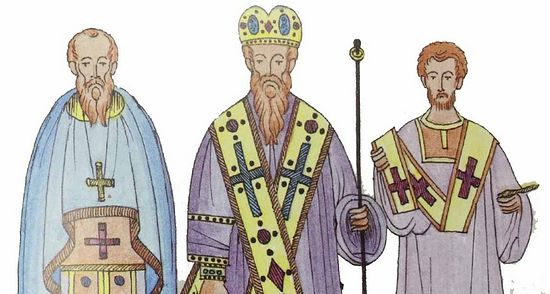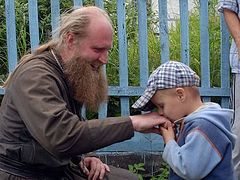The Orthodox Christian respects and loves the clergy. Knowing that the clergy are servants of God and man, devoting their life for the salvation of Christ’s flock. The Orthodox Christian expresses his gratitude and respect to them on every occasion.
First, the Priest is addressed as “Father” by all, for he is the spiritual father of his flock; he is their teacher, confessor, sanctifier, protector, intercessorand healer. There are people that belong to Christian confessions that do not call their clergy, “Father”. But let us consider the words of Saint Paul, “For if you were to have countless tutors in Christ, yet you would not have many fathers; for in Christ Jesus I became your father through the gospel” (1 Corinthians 4:15). When we also read the gospel according to Saint Luke, we find the rich man calling up to Abraham in heaven with Lazarus in his bosom and addressing him as “Father Abraham” (See St. Luke 16:20-31). Abraham’s response was not, “Do you not realize that only God the Father is to be called Father?” Rather, he replied, “Son, remember”. In the Gospel of St. Matthew 23:8-10 Jesus says, “But you, do not be called ‘Rabbi'; for One is your Teacher, the Christ, and you are all brethren. Do not call anyone on earth your father; for One is your Father, He who is in heaven. And do not be called teachers; for One is your Teacher, the Christ”. Jesus warns against calling hypocrites “father” and “teacher”. Far from being a prohibition against using these terms under any circumstances, it is a warning not to use them undeservedly. Both terms are applied to men in the New Testament. “Father” is used in Luke 16:24; 1 Cor. 4:15; and Col. 3:21. In the earliest Christian communities, this term was applied to Bishops and Presbyters (Priests), because they represent the Father in the Church. “Teacher” is used in John 3:10; Acts 13:1; 1 Cor. 12:28; Eph. 4:11; and 2 Timothy 1:11. (Orthodox Study Bible).
Second, when the Orthodox Christians greet their Priest they kiss his hand as an expression of respect, as recognition of his Priesthood i.e., the grace of God that was bestowed upon him on the day of his ordination and as a veneration to the holiness of his Sacred Office and duties.
The fact that the Priest handles the Holy of Holies, that is, the Holy and Precious Body and Blood of Christ, when he offers the Divine Liturgy, is acknowledged by the Orthodox faithful, at all time throughout the world, as a great and awesome blessing.
The hands that touch and offer the Bloodless Sacrifice on the Holy Altar; the hands that give to us the Holy Body and Precious Blood of Christ; the hands that baptize and anoint us with the Mystery of Holy Chrism; the hands that absolve us in the Sacrament of Penance and Confession; the hands that bless our union in the Sacrament of Holy Matrimony and anoint our bodies with the healing oil of the Sacrament of Holy Unction; the hands that sprinkle upon us the Holy Water of Sanctification; the hands that bless us, alive and dead, these hands are the instruments of salvation. For this reason Orthodox Christians throughout the centuries have kissed the hand of our Priest when we greet him either in church when he distributes the ‘Antidoron’ at the end of the Divine Liturgy or outside the church whenever we meet him.
The Holy Apostle Paul writes: “Remember your leaders, those who spoke to you the word of God, consider the outcome of their life and imitate their faith; Jesus Christ is the same yesterday and today and forever. Do not be led away by diverse and strange teachings. Obey your leaders and submit to them; for they are keeping watch over your souls, as men who will have to give an account. Let them do this joyfully, and not sadly, for that would be of no advantage to you” (Hebrews 13:7-9, 13, 17).
No one should slander, disrespect, criticize, lie, or attempt to discredit and undermine the sacred mission of his ministry. Instead the Orthodox Christian should make every effort to share and support his ministry. All who are in responsible positions i.e., members of the parish council, heads of the various parish ministries, committee chairmen, employees of the parish, etc. within the parish must always seek his approval or blessing before making any decision or taking any action. As the head of the parish, he is totally responsible to God and the Metropolitan of all that takes place within his parish. Orthodox Christians that understand their Christian faith trust and cooperate with their priest and do not challenge his Office and his every decision.




